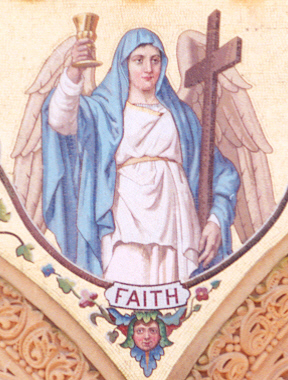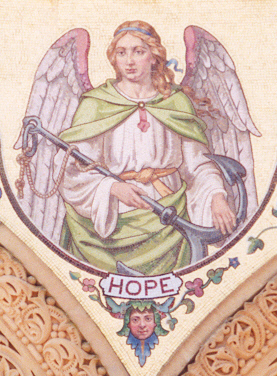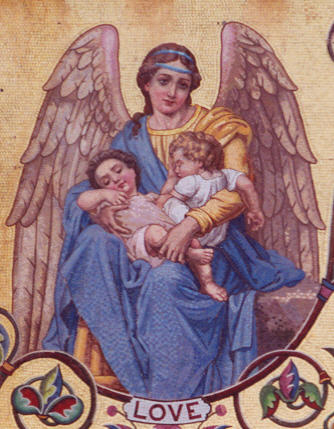
Return to
Index The Catholic Faith
Return to
Level Three Topic Index
Home Page
Grace, especially sanctifying grace, is God's most wonderful gift to the Christian. It fills us with God's life, making us his adopted sons and daughters. It makes us holy temples of the Spirit, who comes to live in our souls. When the Spirit comes to us he brings three virtues that help us to believe, trust, and love God. These are called the virtues of faith, hope, and charity.
A virtue is a permanent power that helps us to do good and avoid evil. It can be either natural (something we work for, such as the virtue or power to be honest) or supernatural (given directly by God without our having to work for it). Faith, hope, and charity are supernatural virtues given to our souls at Baptism along with sanctifying grace. These three powers are also called theological virtues. The word "theological" means "of God", so this name reminds us that faith, hope, and charity come from God and are meant to help us live for God.
Whoever is in the state of sanctifying grace (that is, a person who is baptized and has not lost this grace by mortal sin) has these powers. But they are like muscles of the soul that need to be strengthened by exercise if they are to be in good shape and useful to us. The way we exercise these spiritual muscles is by good works and by prayer, especially the acts of faith, hope, and charity.
The Power of Faith

With the virtue of faith we receive the power to believe in God and in all that he has revealed through Christ and the Church. Faith helps us to see how all-good, all-loving, and all-truthful God is. It helps move us to give ourselves to him completely. Without faith, we would never be able to believe in God or in the revelation he has given us. Thus, we see right away that faith is necessary for salvation; it makes us just, or holy, in the sight of God as Saint Paul reminded the Christians in Rome: "now that we have been justified by faith, we are at peace with God through our Lord Jesus Christ" (Rom 5:1).
There is a big difference between believing something and understanding something. The power of faith makes it possible for us to believe what God has revealed. This means that we say "yes" to the truth even if we don't fully understand it. For example, a judge or a jury believes the testimony of a witness in court. They were not present at the scene of the accident or crime but the witness was. They accept his word as true. We were not present during Christ's life but the apostles were. Through the supernatural virtue of faith we accept their testimony as true - that Jesus worked great miracles and rose from the dead. And God blesses this faith which we have in his Son, in his apostles, and in the Church: "Blessed are they who have not seen and have believed" (Jn 20:29).
For
our faith to be true and pleasing to God it must be:
1. Firm: We must place all our faith in God whom we know
could never deceive us or lead us astray.
2. Complete: We must accept all that God has revealed, not
simply "picking and choosing" from among Our Lord's teachings.
An Act of Faith
O my God, I firmly believe that you are one God in three Divine Persons, Father, Son, and Holy Spirit; I believe that your Divine Son became man and died for our sins, and that he will come to judge the living and the dead. I believe these and all the truths that the Holy Catholic Church teaches, because you have revealed them, who can neither deceive nor be deceived.
The Power of Hope

The virtue of hope makes it possible for Christians to trust in God. It helps us to find comfort in Jesus' promise of eternal life: "I am the resurrection and the life: whoever believes in me, though he should die, will come to life" (Jn 11:25-26). Hope has to do with things that seem impossible such as salvation. Do you remember when Jesus said how hard it would be for a rich man to enter Heaven and the disciples asked him who could then be saved? (Mt 19:24-25). Well, Jesus' response to his disciples shows us that hope really means. He said, "For man it is impossible; but for God all things are possible" (Mt 19:26). Hope tells us that God, who promised Heaven to us, will give us all the strength we need to get there. He is faithful to his word and so we can put our trust in him.
An Act of Hope
O my God, relying on your infinite goodness and promises, I hope to obtain pardon of my sins, the help of your grace, and life everlasting, through the merits of Jesus Christ, my Lord and Redeemer.
The Power of Charity

Charity (also called love) is the greatest of the three supernatural virtues, as Saint Paul told the Christians of Corinth: "There are in the end three things that last: faith, hope, and love, and the greatest of these is love" (1 Cor 13:13).
Charity is the power by which we love God above all things and our neighbor as ourselves. You will remember that Jesus called this the greatest commandment of God. It has such a high place of honor because it is the bond of friendship between God and man. Saint John, often called the "Apostle of Love", told us that by charity God dwells in our souls: "God is love, and he who abides in love abides in God, and God in him" (Jn 4:16).
But what is love? Some people think that it means feeling good about someone or something. The are very wrong! While it is true that we might feel good about someone we love, this is not what love means. True love means that we want only what is really good for the person. To love God means that we want to please him by doing good and avoiding sin. To love our neighbors means that we want good things for them, especially that they reach Heaven. This is why Jesus told us that we must not wish evil things for others, not even our enemies! (Mt 5:43-48).
An Act of Love
O my God, O love you above all things, with all my whole heart and soul, because you are all good and worthy of all love. I love my neighbor as myself for the love of you. I forgive all who have injured me and ask pardon of all whom I have injured.
Used with the permission of The Ignatius Press 800-799-5534
Return to
Index The Catholic Faith
Return to
Level Three Topic Index
Top
Home Page